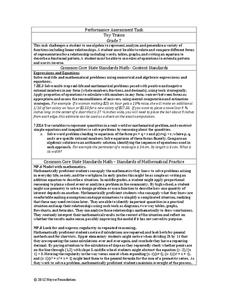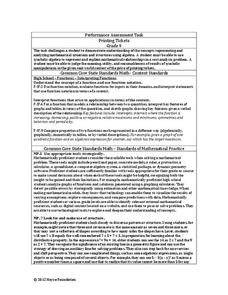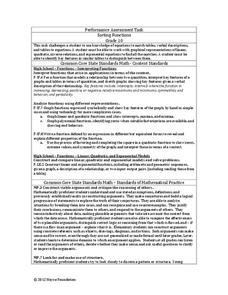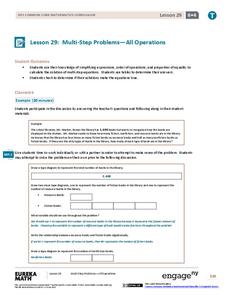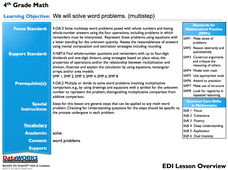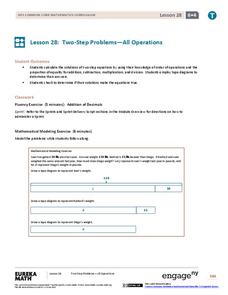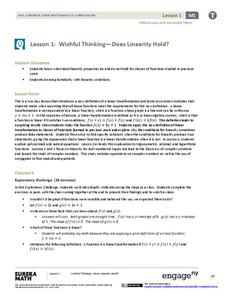Curated OER
Word Problems that Use All Operations
Although this word problem could be solved without algebra, it is an ideal way to incorporate algebraic equations and variables for easier solutions. The answer is explained below, so use this as an all-class warm up and cover up the...
Curated OER
Who Wants to Win Millions?
Similar to the popular game Jeopardy, pre-algebra students will play to win. This game focuses on solving and writing simple equations using subtraction, multiplication, or addition. A great way to review for the big test!
Math Drills
Missing Numbers in Equations (B)
Third and fourth graders use the divisors, dividends, and quotients to discover the missing numbers. They solve 32 problems in all, and fulfill the requirements of CCSS.Math.Content.3.OA.4
Curated OER
Algebra II Chapter 11 Test
In this Algebra II worksheet, students assess their knowledge of rational algebraic expressions. The three page worksheet contains a combination of twenty-three multiple choice, short answer, and word problems. Answers are not...
Curated OER
Awareness of Pre-algebra Concepts
Students work in a cooperative group of three to solve algebraic equations with roles assigned for manipulator, recorder, and checker. They utilize hands-on learning materials imbedded in the lesson plan.
Mathematics Assessment Project
A Golden Crown?
In this assessment task, learners determine whether a crown with given information is composed of pure gold. The task expects algebraic and numerical solution methods, so unlike Archimedes, no bathtub is necessary.
Kenan Fellows
Solutions
Scientists require specific chemical solutions for their experiments. In the seventh and final installment in a series that integrates chemistry and algebra II, scholars learn to set up a system of equations to solve the volume of a...
Noyce Foundation
Toy Trains
Scholars identify and continue the numerical pattern for the number of wheels on a train. Using the established pattern and its inverse, they determine whether a number of wheels is possible. Pupils finish...
Kenan Fellows
Isotopic Pennies
Many people confuse atomic mass and atomic numbers. The sixth of seven lessons in a unit requires scholars to find the weight of different groups of pennies. Then, they must solve how many of each type of penny exists in a closed system...
Inside Mathematics
Printing Tickets
Determine the better deal. Pupils write the equation for the cost of printing tickets from different printers. They compare the costs graphically and algebraicaly to determine which printer has the best deal based upon the quantity of...
Inside Mathematics
Sorting Functions
Graph A goes with equation C, but table B. The short assessment task requires class members to match graphs with their corresponding tables, equations, and verbalized rules. Pupils then provide explanations on the process they used to...
Kenan Fellows
Determining the Atomic Mass of Elements in a Compound Using Matrices
Scholars apply concepts learned in both Algebra II and Chemistry to answer the questions on the provided worksheet. The activity allows for extra practice in both classes and helps connect concepts usually taught in isolation. The...
Inside Mathematics
Two Solutions
Many problems in life have more than one possible solution, and the same is true for advanced mathematics. Scholars solve seven problems that all have at least two solutions. Then three higher-level thinking questions challenge them to...
California Education Partners
T Shirts
Which deal is best? Learners determine which of two companies has the best deal for a particular number of shirts. They begin by creating a table and equations containing each company's pricing structure....
EngageNY
Multi-Step Problems—All Operations
Harness the power of algebra to solve problems. Young mathematicians learn to work out multi-step problems by applying algebraic techniques, such as solving equations and proportions. They use tape diagrams to model the problem to finish...
Virginia Department of Education
Balanced
Bring balance to your lesson plans with an activity that asks individuals to solve one-step linear equations with inverse operations. Balance scales help learners understand the concept of isolating the variable.
EngageNY
End-of-Module Assessment Task: Grade 7 Module 2
Learners demonstrate their ability to operate with rational numbers through a five-question assessment that includes questions ranging from simple operations with integers to solving two-step equations with rational coefficients.
Mathematics Vision Project
Module 7: Trigonometric Functions, Equations, and Identities
Show your class that trigonometric functions have characteristics of their own. A resource explores the features of trigonometric functions. Learners then connect those concepts to inverse trigonometric functions and trigonometric...
DataWorks
4th Grade Math: Multi-Step Word Problems
Solving word problems requires reading comprehension and math computation. Through an interactive slideshow presentation, fourth graders observe and follow each step toward solve multiplication and division word problems.
Flipped Math
Addition Postulate
Add a little algebra to the geometry. Class members learn about the Addition Postulate for segments and angles. The pupils use their knowledge of solving equations to find lengths of segments and measures of angles. Individuals apply...
Curated OER
Transforming Formulas
Solving for x is a classic algebra scenario. Now, solve for x when the other terms in the equation are variables. Isolate the correct variable and practice writing the equation first before solving.
EngageNY
Two-Step Problems—All Operations
Step 1: Use the resource. Step 2: Watch your class become experts in solving two-step problems. Scholars learn to solve two-step word problems in context. They use tape diagrams and algebraic techniques to break the problem into two,...
PBL Pathways
Gas Prices
How can math help your vehicle run better? Complete an interesting project-based learning task with your classes to determine the cheapest approach to mixing the ideal octane level of gasoline. Scholars create and solve a system of...
EngageNY
Wishful Thinking—Does Linearity Hold? (Part 1)
Not all linear functions are linear transformations — show your class the difference. The first lesson in a unit on linear transformations and complex numbers that spans 32 segments introduces the concept of linear transformations and...







